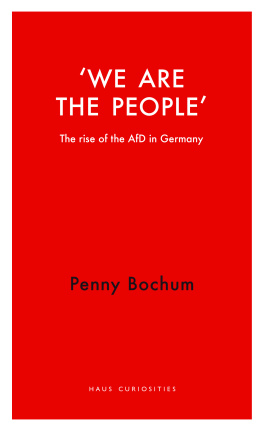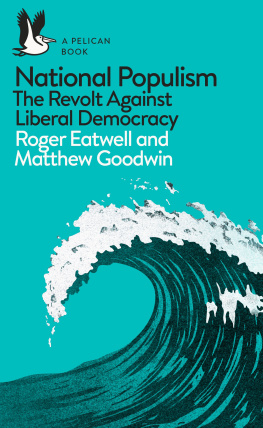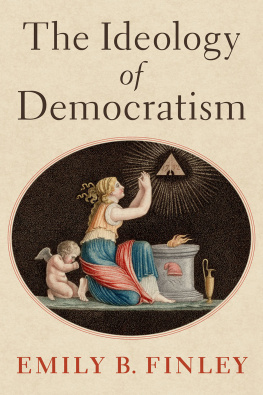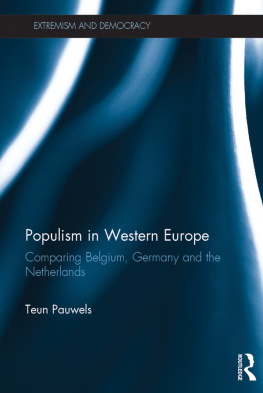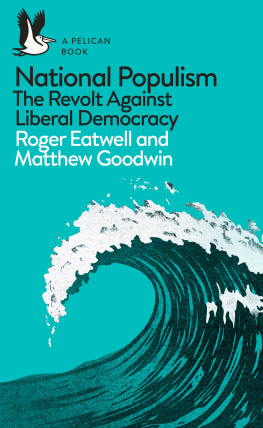First published by Haus Publishing in 2020
4 Cinnamon Row
London SW11 3TW
www.hauspublishing.com
Copyright 2020 Penny Bochum
The right of the author to be identified as the author
of this work has been asserted in accordance with
the Copyright, Designs and Patents Act 1988
A CIP catalogue record for this book is
available from the British Library
Print ISBN: 978-1-912208-92-0
Ebook ISBN: 978-1-912208-93-7
Typeset in Garamond by MacGuru Ltd
Printed in Czech Republic
All rights reserved
1
Introduction: The past rears its head
The murder of a conservative politician in the summer of 2019 sent shock waves through German society. Walter Libcke, president of the Christian Democratic Union (CDU) in the district of Kassel in Hesse, had been receiving death threats for several years because of his support for Chancellor Angela Merkels pro-refugee immigration policy. On 2 June 2019, he was shot in the head at close range; shortly afterwards, a right-wing extremist was arrested. Two months later, another armed right-wing extremist livestreamed his attack on a synagogue where people were marking Yom Kippur in the east German town of Halle, killing two people on the street outside.
In the aftermath of Lbckes murder, as the police investigated the extreme-right scene in Kassel, accusations flew around the political arena. Senior politicians denounced the far-right populists, the Alternative for Germany (AfD), arguing that they bore some responsibility for the murder. The CDUs general secretary, Annegret Kramp-Karrenbauer (known as AKK), said that hatred and hate speech as practised by the AfD and AfD leaders, lower inhibitions so that they evidently turn into pure violence, and her predecessor stated that AfD politicians were complicit in the murder.
The AfD burst onto the political scene in 2013 and swept into parliament as the third largest party in the 2017 national election. Its short history is a tale of factionalism, splits and radicalisation, and it has made waves with its provocative behaviour, a series of extremist statements and its rejection of the post-war political consensus. Beginning as a eurosceptic party, it rapidly evolved into a far-right populist party following a series of power struggles and now has a powerful extremist, nationalist wing. With a xenophobic, anti-establishment message, the party has positioned itself as the voice of the people against the established elite. It calls on courageous citizens and patriots to reject the current state of affairs in Germany, maintaining that the nations political system is illegitimate and arguing for the reinstatement of German Leitkultur (leading culture).*
Shortly before the 2017 election, Germanys foreign minister, Sigmar Gabriel, said, If the AfD actually makes it into the Bundestag, Nazis will speak in the Reichstag for the first time in over 70 years. Two months later, AfD members of parliament and top officials marched with xenophobic groups, hooligans and neo-Nazis in street protests in the east German towns of Chemnitz and Kthen. Demonstrators chanted racist slogans, gave Nazi salutes and reportedly hunted foreigners in the streets. In Chemnitz, AfD leaders publicly associated themselves with Pegida (Patriotic Europeans against the Islamisation of the West the thuggish anti-Islam, far-right movement) for the first time.
Meanwhile, the political establishment has struggled to deal with the rise of the AfD. The partys success has not only posed uncomfortable questions about Germanys Vergangenheitsbewaltigung (how it copes with its past) but also fundamentally changed both the political agenda and the manner of debate. Thirty years after unification, the rise of the AfD has exposed a continuing divide between the east and west of the country. While the party receives support from all regions, it is far stronger in the east, which is also the bastion of the extreme wing of the party. With its slogan Vollende die Wende meaning finish unification the party has appealed to discontented easterners who still feel that they are second-class citizens. The call We are the People, itself first heard on the streets of East Germany in the 1989 demonstrations against the communist regime, has been heard once again this time, on anti-establishment, anti-foreigner marches in eastern cities. The slogan was also appropriated by the AfD in its election literature for state elections in the autumn of 2019.
Despite the partys radicalisation, its vote share has held firm, especially in the east. The October 2019 election in Thuringia illustrated this worrying fact: 23% of voters backed the AfD barely a month after a court had ruled that the regional leader, Bjrn Hcke, could legally be called a fascist.
The threat posed by the AfD is taken extremely seriously in Germany, and rightly so. Yet the AfD can be contained if the centre holds. The centre parties must unite behind a progressive agenda that addresses the root causes of populism and robustly defends liberal democracy; they must continue to refuse to normalise populism by refusing cooperation in national and state governments; and they must relentlessly expose the AfDs destructive, divisive agenda, including the extremism within its ranks. The AfD may have won third place in the 2017 election, but the majority of the German population do not vote AfD and do not subscribe to the AfDs agenda. Germany can face this challenge down.
*Leitkultur is a controversial term used to describe the dominance of German culture such as language and values and is used in opposition to the idea of multiculturalism.
2
A worldwide populist wave
Populism, as defined by political scientist Cas Mudde, is a thin-centred ideology, moralistic rather than programmatic, which considers society to be ultimately separated into two homogeneous and antagonistic groups, the pure people versus the corrupt elite, and which argues that politics should be an expression of the volont gnrale (general will) of the people.
Populists reject the parts of liberal democracy they regard as distorting the true popular will such as established political parties and the media rather than democracy itself, and they often argue for referenda as a means of expressing the will of the people. As Jan-Werner Mller has argued, The danger to democracies today is not some comprehensive ideology that systematically denies democratic ideals. The danger is populism a degraded form of democracy that promises to make good on democracys highest ideals (Let the people rule!).
The identity of the people is asserted by excluding outsiders, usually social or cultural minorities or migrants, who are attacked in line with an us against them mentality. This is a key aspect of right populism, which features nationalism and hostility to immigrants and refugees.

